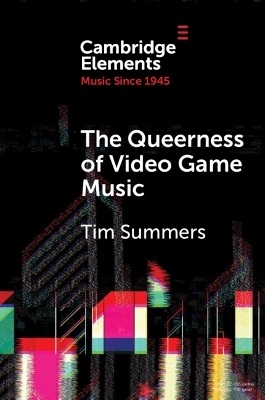
The Queerness of Video Game Music
Seiten
2023
Cambridge University Press (Verlag)
978-1-009-37140-7 (ISBN)
Cambridge University Press (Verlag)
978-1-009-37140-7 (ISBN)
This Element examines musical structures that provide queer temporal alternatives to normative linear development, and interactive systems that reframe the power relationship between musical material and listener. It also rejecting chrononormativity and discusses music that queers the self/other binary of identity.
Video game music is a significant site of queerness where normative demands are questioned, suspended or loosened. Games resist hegemonic musical logics, challenge musical value systems and use music to complicate essentialist notions of identity. This Element proposes three areas of queerness, each representing different relationships between 'queer design' and 'queer engagement', ranging fromunintentionally resistive to explicit engagement with identity. First, this Element examines musical structures that provide queer temporal alternatives to normative linear development, and interactive systems that reframe the power relationship between musical material and listener. Second, it considers 'retro' or 'chiptune' timbres that queer notions of technological progress to be improvements, rejecting chrononormativity. Finally, the Element discusses music that queers the self/other binary of identity. Games present ways of listening to, engaging with and understanding music that provide opportunities to challenge inherited assumptions and reductive or monolithic values, practices and identities.
Video game music is a significant site of queerness where normative demands are questioned, suspended or loosened. Games resist hegemonic musical logics, challenge musical value systems and use music to complicate essentialist notions of identity. This Element proposes three areas of queerness, each representing different relationships between 'queer design' and 'queer engagement', ranging fromunintentionally resistive to explicit engagement with identity. First, this Element examines musical structures that provide queer temporal alternatives to normative linear development, and interactive systems that reframe the power relationship between musical material and listener. Second, it considers 'retro' or 'chiptune' timbres that queer notions of technological progress to be improvements, rejecting chrononormativity. Finally, the Element discusses music that queers the self/other binary of identity. Games present ways of listening to, engaging with and understanding music that provide opportunities to challenge inherited assumptions and reductive or monolithic values, practices and identities.
Introduction; 1. Structure: queer time and the power of imagined alternatives; 2. Timbre: queering technological progress and anti-chrononormativity; 3. Identity and queer anti-essentialism; Conclusions; References.
| Erscheinungsdatum | 25.07.2023 |
|---|---|
| Reihe/Serie | Elements in Music since 1945 |
| Zusatzinfo | Worked examples or Exercises |
| Verlagsort | Cambridge |
| Sprache | englisch |
| Maße | 152 x 229 mm |
| Gewicht | 140 g |
| Themenwelt | Kunst / Musik / Theater |
| Mathematik / Informatik ► Informatik | |
| Wirtschaft ► Betriebswirtschaft / Management ► Wirtschaftsinformatik | |
| ISBN-10 | 1-009-37140-1 / 1009371401 |
| ISBN-13 | 978-1-009-37140-7 / 9781009371407 |
| Zustand | Neuware |
| Informationen gemäß Produktsicherheitsverordnung (GPSR) | |
| Haben Sie eine Frage zum Produkt? |
Mehr entdecken
aus dem Bereich
aus dem Bereich
Technologische Trends und betriebliche Informationssysteme
Buch | Softcover (2022)
Schäffer-Poeschel (Verlag)
CHF 48,95


